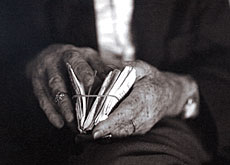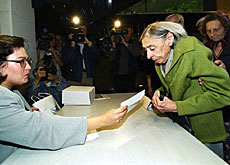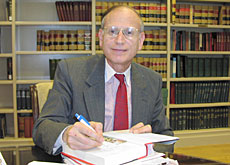Bankers deny obstruction over Holocaust funds

The Swiss Bankers Association (SBA) has rejected claims that banking secrecy is delaying distribution of a $1.25 billion (SFr1.64 billion) settlement with Holocaust victims.
It said a committee under former Federal Reserve Board chairman Paul Volcker had carried out a comprehensive audit of all dormant Holocaust-era accounts.
“Paul Volcker and his committee conducted a very thorough investigation and had full access to the bank accounts,” SBA spokesman Thomas Sutter told swissinfo.
The SBA’s reaction comes after two United States lawyers criticised Swiss banks for being obstructive.
Judah Gribetz, a Manhattan lawyer overseeing the distribution of the settlement money, has alleged that Swiss banks restricted information about millions of bank accounts opened in Switzerland during the Nazi era.
Interim report
His claim was filed last week in a report to Edward Korman, chief judge of the United States District Court in Brooklyn, who presided over a class-action suit brought by Jewish organisations and survivors of the Holocaust against major Swiss banks
The global accord between Jewish plaintiff groups and Swiss banks Credit Suisse and UBS was signed in August 1998, but so far only about a third of the money has been paid to claimants.
In another attack, Burt Neuborne, the lead counsel for Jewish groups and Holocaust victims, has accused both Swiss banks and the Swiss government of obstructing distribution of the money.
He said the Swiss authorities had placed “every conceivable obstacle” in the way since the beginning of the class action.
“Swiss banking laws are hindering the examination of 4.1 million accounts, which could contribute to a speedy distribution of the money,” he said.
Accusations rejected
The SBA’s Thomas Sutter said the banks totally rejected the accusations.
He added that the vast majority of Nazi-era accounts were totally unrelated to the Holocaust, and it was never part of the settlement to provide access to all accounts.
“In our opinion, it makes no sense to centralise all bank accounts that were active during the Second World War,” commented Sutter.
“The Volcker committee has already had access and it makes no sense to repeat the procedure,” he added.
Having reviewed all the 4.1 million accounts opened in Switzerland before and during the Second World War, the Volcker committee presented its final report in December 1999.
A team of 600 auditors working for the committee cited 53,388 accounts as “probably or possibly” related to Nazi victims.
Out of line
Hans Bär, a member of Volcker’s team and a former bank chairman, told swissinfo that Gribetz’s comments were out of place.
“I think the most surprising thing [in the report] is the acrimonious tone, for which there is absolutely no reason,” he said.
“Gribetz complains in one part of his statement that the documents aren’t available. I would like to remind you that this is material dating back 60 or 70 years,” he said.
“The law requires documents to be retained for ten years. It is a miracle that any documents are available at all. To complain that they are not all there is ridiculous,” he added.
The Swiss Federal Banking Commission, which is part of the finance ministry, said the claims were not really an issue for it.
“We are not involved, either in the settlement or its execution,” commented spokeswoman Christina Bürgi.
swissinfo, Robert Brookes
The Swiss Bankers Association has rejected accusations that it is impeding the distribution of money to Holocaust victims.
It says a comprehensive audit of Holocaust-era accounts held in Swiss banks has been carried out and that the findings were made public in December 1999.
Two United States lawyers argue that Swiss banking secrecy could deprive many Holocaust victims and their heirs of part of a $1.25 billion settlement between Swiss banks and Holocaust victims.
UBS and Credit Suisse, agreed on a global settlement with Jewish organisations and Holocaust victims in August 1998.
The two banks agreed to pay $1.25 billion in four payments over three years.
The money went into a fund in exchange for the dropping of all class-action litigation against them in the United States. Boycotts and threats of boycotts were also dropped
Action against the Swiss government and the Swiss National Bank was also stopped.

In compliance with the JTI standards
More: SWI swissinfo.ch certified by the Journalism Trust Initiative










You can find an overview of ongoing debates with our journalists here . Please join us!
If you want to start a conversation about a topic raised in this article or want to report factual errors, email us at english@swissinfo.ch.